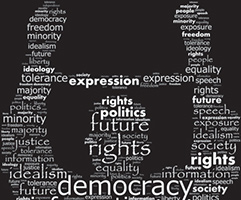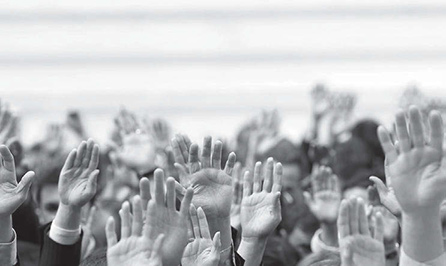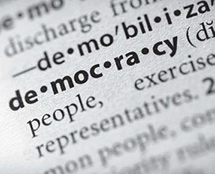
Jill Gentile
SPECIAL SECTION: PSYCHOANALYSIS AND FREE SPEECH
Jill Gentile
Jill Gentile, Ph.D., faculty member at NYU Postdoctoral Program in Psychotherapy and Psychoanalysis, co-authored Feminine Law: Freud, Free Speech, and the Voice of Desire (Karnac Books, 2016) examining free association and free speech, and psychoanalysis as a democratic practice.

Jill Gentile
Anyone passingly familiar with the history of psychoanalysis knows the field has occupied an embattled, marginalized, often indeterminate identity, and its survival has often seemed precarious. Yet it is from this perch on the margins of culture and community that psychoanalysis speaks. By channeling a vortex of unconscious and conscious energies, it gives voice to raw, novel free associations. In fact, because psychoanalysis speaks and because it hails listening and speaking as the medium for therapeutic action, “the talking cure” is powerfully relevant, even essential, to our personal and collective development. In the words of Bruce Fink in his introduction on Lacanian psychoanalysis, it sets in motion “a dialectic of desire, set free of the function inherent in demand.”
Psychoanalysis achieves its results through a remarkably human, nontechnological practice of talking freely, of free association. Its essential validity for a symbolic species is inherent in its design. As a result, psychoanalysis should always have a place within the culture, because its methods reveal knowledge that is subjectively and objectively valid. Psychoanalysts everywhere speak (even if in hushed, diffident tones) of a set of ideas and practices that seeks to rouse patients from a kind of wakeful slumber and help them fulfill dreams of liberation and deep transformation. All by means of talking and listening. In this profound mechanism, psychoanalysis’s contributions to the democratic dream of shared, equal and inclusive speech are real. What psychoanalysis leverages, through human relationships, would be available to nearly everyone were it not for the persistent problem of unequal access to speech. Once we recognize this, its relevance to a theory of democracy is obvious.
Despite (and perhaps because of) this proximity to the holy grail that defines and differentiates humanity from other species, psychoanalysis has had to assert and reassert its legitimacy for some 120 years, if we date it to the publication in 1895 of Freud and Breuer’s Studies on Hysteria. Democracy, on the other hand, has been at it for two-and-a-half millennia, ever since the Athenian constitution placed the power of political choice in the hands of the “demos.” Although our memories of Athens’s political experiment tend to be both rosy and dim (we forget the internal contention and the ultimate external defeat), democracy has survived as a set of ideas and practices that nearly everyone acknowledges and governments everywhere reckon with. While psychoanalysis finds itself on the sidelines of both the mental health professions and of the culture at large, democracy has gained a privileged and even hegemonic position.

Modern democracies, which trace back to American and French models, have enjoyed a far more sustained success than their Greek antecedent. This success is partly due to their claim to advance “natural law,” which was a core principle of the Enlightenment philosophy that inspired revolt against arbitrary power. Ideas of natural law and innate rights would not just inspire revolt, they would also find their way into that enduring document that links our individual liberties to our social collectivity, the United States Constitution. Though its framers may not have chosen the word “democracy”—and may have steered clear of it, given its negative historical associations with mob rule—they still might have concluded, as political theorist John Dunn has, that democracy is “the most natural of all regimes,” as it comes “closest to preserving the freedom which nature allows to human beings.”

SIGMUND FREUD AND JOHN DUNN
As our world today grows increasingly polarized, democracy has come to seem less a neutral and universally appealing ideal. The term has been degraded, not only through its entanglement with unregulated capitalism but also by its appropriation by many false claimants. Certainly, actual, direct democracy, true rule by the people, (as opposed to rule by detached representatives) has become improbable and undesirable in today’s populous, expansive and complicated world.
Both democracy and psychoanalysis evolved as rebukes to repression and tyranny.
But even our far more realistic contemporary models of representative democracy reveal incredible gaps in equality that belie the promise of individual and collective sovereignty. Whereas Freud had revealed that the ego is not master of its own house, John Dunn alerts us to “the distinctive imaginative deceptions” of democracy, specifically our tendency to fall under the “hypnotic spell” of over-authorizing our sovereignty. One might conclude we have given up the “dream of ruling ourselves,” a dream Freud entertained but came to recognize as an impossible aspiration, and one that many people do not even want for themselves. After all, Freud bore witness to man’s dehumanizing inclinations and deceptions in a world riven by brutality and warfare. His disillusionment deepened. Neither democracy nor psychoanalysis, words Freud did not commingle in his lexicon, seemed destined for “victory.”
Yet, representative democracy, in today’s world, has no near rival as a system of government. This seems to be the case despite burgeoning government incursions and surveillance, and despite the increasingly unchecked power of corporations to buy influence and subvert basic equality. It seems to be the case despite the fact that violent and tyrannical regimes so often quickly reimpose their authority, thereby squelching the sparks of democratic desire, such as those that ignited the Arab Spring. Dunn attributes this, arguably provisional, “global comparative advantage” to democracy’s recognition of its citizenry “not merely as notional bearers of ultimate authority, but also as site of power in themselves, with a capacity to act and exert force on their own behalf.”
We psychoanalysts might imagine that herein too lies the very basis for psychoanalysis’s enduring validity and promise. Was not self-sovereignty an essential aspect of Freud’s dream? Democracy’s narrative is actually the story of personal and political, individual and collective, agency—Freud’s reverberating, perplexing motifs.
Beyond this commonality, Dunn’s compelling narrative of democracy’s triumph is music to a psychoanalyst’s ears. Dunn, possibly channeling Freud, tells the story of the word “democracy”: of that word’s “spectacular” diffusion; its translation, interpretation, presumptive authority and elusive meanings—and of our complicated relationship with that word, implicitly including our transference to it. It is the story of “democracy,” to borrow from Jean LaPlanche, as a quintessential “enigmatic signifier.” The bewilderingly complex social and political forces that inculcate the word so deeply in our lexicons, across so many languages and cultures, also saturate and burden the word with confusion. As such, democracy is a word that inspires renewed efforts to grapple with what it means and what it authorizes.
In short in Dunn’s telling, the historical fate of democracy runs parallel to the fate of the word “democracy” itself, “in all its complexity and opacity.” The endurance and dispersal of the word “democracy” reveals the word’s sheer resistance to subjugation. Democracy emerges as the symbol of “the people in their full sovereign indefinition,” signifying freedom and its paradoxes, just as it signifies desire.

Might it be that democracy’s enduring relevance and comparative advantage is a tribute itself to its very own special, maybe sacred, relationship to the practice of free speech? Might democracy’s status as a beguiling master signifier reveal that its mission is essentially also a psychoanalytic and semiotic one. Might psychoanalysis’s commitment to free association—freedom of thought and of speech—instantiate, by its fundamental rule, an ever impossible and elusive but decidedly democratizing mission? The therapeutic action of speech illuminates the life of the word, of the signifier, the movement of which is a sign itself of the liberation of desire’s democratic impulse. Democracy’s semiotic ascendancy reveals speech’s democratizing action. Speech reveals the contagious, reverberating and transformational flow of desire and its symbols.
Both democracy and psychoanalysis evolved as rebukes to repression and tyranny. They both established imaginative sets of ideas and practices for helping people claim the power of self-rule. Both claimed a progressive enlightenment born of truth seeking and soul searching. And both find mutual resonance, sustenance and relevance to each other and to humanity, in their signature practices, free association and free speech. Attention to speech opens our capacity to hear it, to recognize its fundamental status as a democratizing practice. Perhaps, from the vantage point of the far more ancient word “democracy,” our still youthful “psychoanalysis” simply needs more time on our shared planet to disperse, disseminate, democratize its signifying message and along with that, its replenishing, liberating pulse of desire.